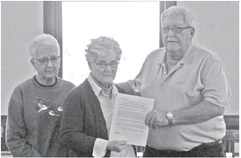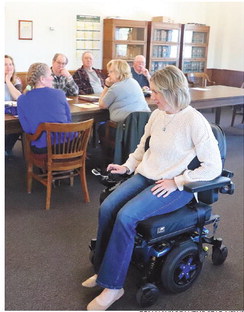County OKs $81,000 for election help


Reserve funds will be used to help with purchase of election equipment
BY BRIAN WILSON
NEWS EDITOR
Where should it come from?
That was the primary question for supervisors at Wednesday’s county board session as they discussed helping local municipalities with the purchase of new election equipment.
The board was faced with competing resolutions, both of which called for the county to contribute $3,000 to each local municipality to help pay for the equipment upgrades. The election equipment used in the county is obsolete and parts for it are becoming harder to find. According to county clerk Andria Farrand, the cost of the equipment will be $5,300 for municipalities that need only one ballot counter and $9,000 if they need a second unit. She said all but six municipalities were going with the $5,300 unit.
While there was general agreement at Wednesday’s county board meeting that the county should help municipalities pay for election equipment there was disagreement about which fund the money should come out of. The resolution from the finance committee called for the money to come from the Powerline Impact Fee fund, while an alternate resolution from supervisor Ray Soper called for the money to come from the general fund reserves.
See COUNTY Supervisor Rollie Thums introduced a third option to take the money out of the county’s forestry revenues.
Supervisor Lester Lewis supported Thums’ idea noting that in Clark County, the county board paid for all the equipment cost using forest revenues.
Supervisor Mike Bub opposed the idea of tapping into forestry funds to pay for the election equipment. “I think people need to be aware that you may have a dramatic shift in [the cost of] replacing the Chelsea Dam,” he warned, noting the dam replacement comes out of the forestry accounts. “People may think it is an unlimited amount of money,” he said, adding that it was getting depleted with large projects being taken from it. “You might be robbing Peter to pay Paul,” he said.
Forestry chairman Chuck Zenner agreed with Bub and said the finance committee had already tapped into the forestry revenues for $150,000 to help balance the 2020 budget. He also warned about potential work needing to be done at Miller Dam.
Bub also objected to other supervisors second-guessing how the forestry committee was spending money. Taylor County government is decentralized with signifi cant authority left up to the standing committees. Bub cautioned that the county could be going down a slippery slope if there is a lack of trust in committees.
County finance director Larry Brandl said the idea that forestry funds are separate from the general fund is a misperception. He explained that revenue from logging in the forest is kept within the department for that budget year, but at the end of the year it is transferred into the general fund as part of the general reserves. “It gets commingled,” Brandl said. With that explanation, Thums withdrew his amendment to take the money from forestry with the understanding that if the request to use powerline funds would fail, the board would still have a chance to vote on it. “There is no quid pro quo here,” joked supervisor Tim Hansen.
Soper said he objected to using powerline funds because he saw that fund, which is from impact fees paid from the Arrowhead to Weston transmission line, as needing to be conserved for community projects. He said the groups doing those projects generally have limited resources available to them and that he felt it was a better use of the powerline funds to support those projects.
Bub questioned the flat amount of $3,000 per municipality, noting that larger communities, which contribute more into county taxes, have higher costs because they need additional equipment.
Supervisor Scott Mildbrand, said the amount was picked as being about half the estimated cost of the single piece of equipment. “I took the lower price and did half of that,” he said.
Zenner said in deciding on the total to request, the finance committee did not think that asking to completely fund the equipment purchase would pass and so came up with the lower amount to request.
In a pair of votes, supervisors voted against using powerline funds on a 14-3 vote with Mildbrand, Zenner and Rod Adams in favor. The board then voted unanimously to approve tapping into general fund reserves to purchase $81,000 worth of election equipment for the local municipalities.
Budget approved
Property taxpayers in Taylor County could see the county portion of their tax bill go down as the result of new growth. Supervisors approved the 2020 budget calling for a levy of about $11.8 million and a tax rate of $8.14 per $1,000 of equalized value. Individual taxes may vary because the tax bills are based on the assessed value of property as set by the local municipality.
As in the past, the county is under a tax levy freeze and was only allowed a .967% increase in the levy. The budget presented to the county board represented the finished product of a series of budget sessions that trimmed close to $1 million in projected levy expense.
County taxpayers are helped by the equalized value of the county going up by 5.7% over last year. The total equalized value for the county is at $1,456,713,200 up $78,243,500 from the prior year.
Bub raised concerns in the budget about what he feels is underreporting the expense from the human services department. “Every year we have a deficit,” Bub said asking why the county did not budget for the deficit. “We all know, in honesty, it is a deficit budget,” Bub said of the county budget.
Brandl responded that the deficit amount in human services budget is an accrued deficit over five years and not just one year. As far as accounting for it in the budget, Brandl said there isn’t room under the state levy limits to do it and that it is paid for every year through savings elsewhere in the budget.
“We know human services will be at least a quarter of a million over budget,” Bub said.
Mildbrand noted that much of the overage is due to out of home placements, which are not able to be predicted. He said the human services board has worked to include better estimates of those costs in the budget. “Rome wasn’t built in a day,” he said, noting it was an ongoing process.
The budget was approved with Bub voting against it.
Land purchase
The Taylor County forest will be growing by another 40 acres. Supervisors agreed to purchase a parcel owned by Linda Mezich for $60,000 with the money to come out of the forestry department land acquisition account.
As with prior land purchases in the forest, Thums voiced his objection. “I believe the people of this county are not being well served by buying more property,” he said.
Bub disagreed stating that the timber revenues of logging the parcel will cover a major part of the purchase price and that it is looking long-term into the future for additional revenues decades from now. “I think this is a big advantage for us, that we have resources going forward,” he said.
Bub’s comments were echoed by Knoll who compared the county forest to an annuity that brought revenues into the county for years in the future. He noted the projects and reduction in tax levy that has come as the result of forestry stumpage revenue.
Thums said he would have an easier time supporting the county forest if the logging money would go instantly into the general coffers rather than being held in the forestry department until the end of the year. They are the only ones that seem to have their own pot of gold,” Thums said.
This struck a sore spot for members of the forestry committee. “This is the taxpayers’ forest and the taxpayers’ money I don’t feel anyone on the committee or in the department feels this is their money,” Zenner said, noting that he took insult with Thums’ statement.
In the end, supervisors voted 12-5 to approve the land purchase.
In other business, supervisors:
_ Approved giving the Whittlesey Lions $5,000 in powerline funds to assist with the purchase of new playground equipment at the Lions Park. Supervisors Roiger and Mildbrand abstained since they are members of the club.
_ Approved an ordinance change to require all county-owned vehicles with the exception of the sheriff’s and human services department to have a uniform decal indicating it is a county vehicle. Zenner said an issue was raised with vehicles used by forestry department not being marked as being county-owned and that the ordinance change was to clarify this. Adams suggested it also be applied to county equipment such as graders that are used at worksites. Lewis agreed with the idea and said that direction could be given at the highway committee level.
_ Approved authorizing the forestry department to apply for municipal dam grants that could cover up to 50% of the cost of replacement of the Camp 8 dam. The action does not commit the county to do the project this budget year. Supervisor Gene Knoll had expressed concern with the potential for both the Chelsea and Camp 8 dams needing work and the county being faced with having to potentially delay one of them.
_ Approved a 2% wage increase for each step in the county’s wage scale for county employees effective Jan. 5, 2020.
_ Renewed the contract with Schmeige, Graff and Koch law firm for legislative support of the county board and legal services for child support. The rate is $6,630 per month for human services work and $190 per hour for general government work done by the attorney with $95 per hour billed for paralegal work.







